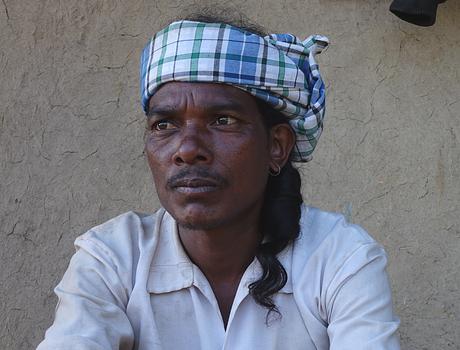Gillian Anderson, Dominic West, Julian Lennon and Sir Mark Rylance join boycott of India’s tiger reserves
December 13, 2017

This page was last updated in 2017 and may contain language which is now outdated.
A host of famous faces have joined Survival International’s call for a global boycott of India’s tiger reserves, in protest at the ban on the recognition of tribal peoples’ rights in the reserves.
They include actor and activist Gillian Anderson OBE, actor Dominic West, Oscar-winner Sir Mark Rylance, and musician and photographer Julian Lennon. Celebrated Indian author and environmentalist Amitav Ghosh also expressed his support for tribal forest rights.
India’s Forest Rights Act guarantees tribal peoples the right to live on and protect their ancestral land. But the country’s National Tiger Conservation Authority (NTCA) has issued an illegal order to ban the recognition of forest rights in tiger reserves across the country.
After petitioning the Indian government on this urgent issue and receiving no reply, Survival is calling for a global tourist boycott of tiger reserves until the order is withdrawn.
 © Gage Skidmore/ Wikimedia
© Gage Skidmore/ Wikimedia
Many tribal peoples face illegal eviction from their land, despite the fact that there is very little evidence connecting their largely sustainable ways of life to the decline in tiger numbers. Forest authorities routinely harass and coerce tribal people into “agreeing” to leave their forest homes, and do not inform them they have the legal right to stay.
After eviction, tribal people face lives of poverty and exclusion on the fringes of Indian society. Meanwhile, huge numbers of tourists are then invited into tiger reserves, disrupting tiger habitats and making tigers more vulnerable to poaching.
A man from the Jenu Keruba tribe, who was evicted from Nagarhole National Park, said: "They evicted us on the pretext that we made noise, that we disturbed the forest, but now there are a lot of jeeps and tourism vehicles – isn’t that a disturbance for the animals?”
 © Brian Gratwicke
© Brian Gratwicke
Tribal peoples have been dependent on and managed their environments for millennia. They are the best conservationists and guardians of the natural world. They should be at the forefront of the environmental movement.
In one tiger reserve in southern India where Soliga tribal people won the right to stay, tiger numbers have increased at above the national average.
Survival’s Director Stephen Corry said: “People are signing up to our boycott once they hear about the human misery behind India’s tiger reserves. The NTCA is pursuing an outdated “fortress conservation” model, and expelling the very owners of the forests who have guarded and maintained them for centuries. It’s not only causing untold suffering, it’s also not going to save the tiger. The NTCA should reverse its policy quickly, for the sake of the tiger, the tribespeople, and the country’s tourism industry.”



